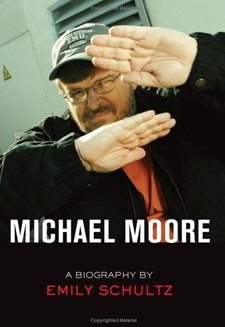"Love him or hate him" as the publisher's blurb says, there's no ignoring Michael Moore: one of the best known and distinctive cultural commentators of our age.
He's the author of best-selling books and the writer and director of award-winning and much-watched documentaries about controversies such as gun ownership and the war in Iraq.
 Anyone hoping for a polemic which takes sides in the causes Michael Moore has championed over the years will, however, be disappointed by Emily Schultz's brief and workmanlike "first-ever" biography of him.
Anyone hoping for a polemic which takes sides in the causes Michael Moore has championed over the years will, however, be disappointed by Emily Schultz's brief and workmanlike "first-ever" biography of him.
That Schultz clearly shares Moore's (for want of a better word) left wing outlook, is obvious from the brusque manner in which she dismisses as insubstantial the numerous websites and books published about his work by Moore's conservative critics.
What does Schultz examine in this book then? Principally, the influence of Moore's social upbringing, his artistic methods, and his relationships with professional colleagues.
Unlike most media professionals, Michael Moore can honestly claim to be of working-class origin. He is the son of an auto-worker from Flint, Michigan, a Motown suburb which he has made world famous as a microcosm of the social consequences of the decline in American's manufacturing industries.
On the whole, Schultz finds Moore to be a faithful chronicler of his community and someone genuinely concerned about its social problems. Moore has invested some of the profits of his movies back into Flint.
On the other hand, she is no investigative journalist: Moore is now a multi-millionaire as a result of his books and films, but this biographer has done none of the financial ferreting about which might have confirmed whether or not Moore's life lived up to the public image symbolised by his baseball cap, baggy jeans and cheap jacket.
Another aspect of Moore's life which Schultz questions is his creative techniques: the confrontational way in which he is known to interview his subjects, the editing of his films, and how he uses music and images in them.
Although some critics have been scathing of Moore's work " Christopher Hitchens once described Farenheit 9/11 as "a sinister exercise in moral frivolity" " on the whole Schultz gives Moore the benefit of the doubt regarding the artistic licence to which he claims is his right.
Finally, Schultz writes a good deal about Moore's professional relationships, citing interviews with former colleagues.
From an early age, Michael Moore was a lone achiever. At the age of 18 he was elected to his own school board " the youngest holder of public office in his State. He then founded and edited his own magazine. Being so self-reliant has not, it seems from this book, equipped Moore to work well with others, and may have contributed to what might be thought inflexible political loyalties.
Schultz explores in detail the dismissal of Moore from the editorship of the influential radical magazine Mother Jones after only one month, allegedly for refusing to print an article critical of that 1980s cause celebre, the Sandinista government of Nicaragua.
Surprisingly, for one so personally associated with his work, Michael Moore was not interviewed for this book. Readers are therefore left with an impression of him as a very private man, who guards his inner thoughts and motivations closely.
We do not learn what, if anything, he has retained of the Christianity he may have learned through his Irish Roman-Catholic upbringing of mass attendance and parochial school.
Whatever you think of the causes he has embraced, Christians cannot but warm to Moore's passionate sense of right and wrong, and the vigour with which he articulates it.
Whether this trait in his character owes something, as his biographer suggests, to Christian influences, is a question which only a fuller biography, prepared with its subject's blessing, is likely to be able to answer.





















